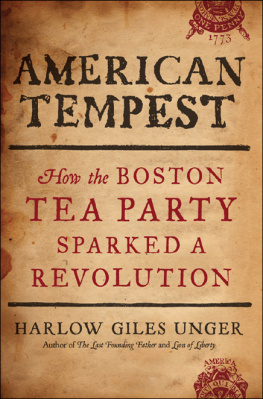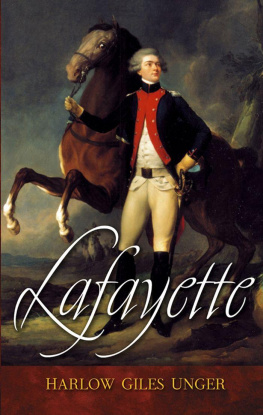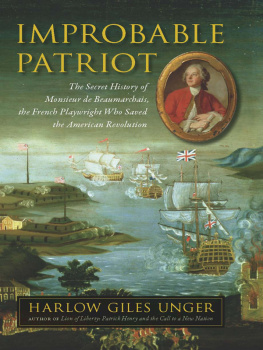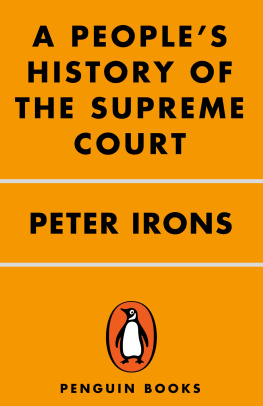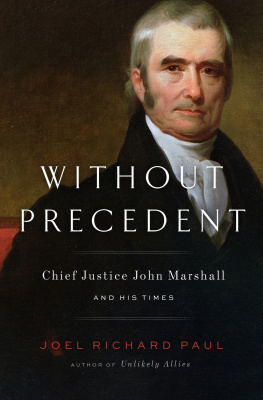
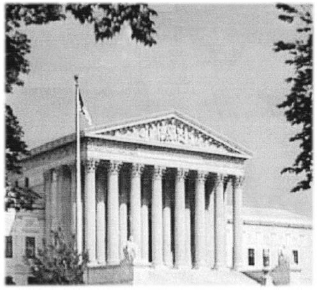


Copyright 2014 by Harlow Giles Unger
All rights reserved. No part of this publication may be reproduced, stored in a retrieval system, or transmitted, in any form or by any means, electronic, mechanical, photocopying, recording, or otherwise, without the prior written permission of the publisher. For information, address Da Capo Press, 44 Farnsworth Street, Third Floor, Boston, MA 02210.
Designed by Trish Wilkinson
Set in 11.5 point Adobe Garamond Pro by The Perseus Books Group
Library of Congress Cataloging-in-Publication Data
Unger, Harlow G., 1931 author.
John Marshall : the chief justice who saved the nation / Harlow Giles Unger.
pages cm
Includes bibliographical references and index.
ISBN 978-0-306-82221-6 (e-book)
1. Marshall, John, 17551835. 2. JudgesUnited StatesBiography. 3. United States. Supreme CourtBiography. I. Title.
KF8745.M3U54 2014
347.73'2634dc23
[B]
2014008405
First Da Capo Press edition 2014
Published by Da Capo Press
A Member of the Perseus Books Group
www.dacapopress.com
Da Capo Press books are available at special discounts for bulk purchases in the U.S. by corporations, institutions, and other organizations. For more information, please contact the Special Markets Department at the Perseus Books Group, 2300 Chestnut Street, Suite 200, Philadelphia, PA 19103, or call (800) 810-4145, ext. 5000, or e-mail special..
10 9 8 7 6 5 4 3 2 1
Contents
Maps
Illustrations
MY DEEPEST THANKS TO FORMER DEPUTY US ATTORNEY GENERAL Edward C. Schmults and to New York attorney Andrew Bab for reviewing the manuscript of this book before its publication. Both were most gracious and generous in sharing their knowledge of history and their understanding of the Constitution. Attorney A. Reading Van Doren Jr., was also kind enough to review the manuscript. I am grateful as well to the staffs at the Supreme Court Historical Society, the John Marshall House, the Massachusetts Historical Society, and the Library of Congress Prints and Photographs Division for their help. And although their names do not appear on the cover, the members of the great publishing and editorial team at Da Capo Press of the Perseus Books group are as responsible as I am for this book. I am truly grateful for and honored by their help and supportespecially, John Radziewicz, Publisher; Robert Pigeon, Executive Editor; Lissa Warren, Vice President, Director of Publicity; Kevin Hanover, Vice President, Director of Marketing; Sean Maher, Marketing Manager; Fred Francis, Managing Editor; Cisca Schreefel, Manager, Editorial Production; Justin Lovell, Editorial Assistant; Trish Wilkinson, Designer; and Josephine Mariea, Copy Editor; Robert Swanson, Indexer. My warmest thanks to you all and to the wonderful sales team of the Perseus Books Group.
CLOUDS OF DOOM SHROUDED THE NATION IN 1800.
George Washington was dead.
For the first time in their twenty-five-year struggle to govern themselves, Americans faced a future without the father of their country to lead them.
And they lost their way.
Absent their commander-in-chief, the men who had helped him lead the nation to independence went mad. Chaos engulfed the land as surviving Founding FathersAdams, Burr, Hamilton, Jefferson, Monroe, and othersturned on each other as they clawed at Washingtons fallen mantle.
In a drama not unlike a classical Greek or Shakespearean tragedy, arrogance and lust for power gripped the souls of national heroes, perverting their patriotism, spurring them to spring on each other, fangs bared, spitting venom. Defying the Declaration of Independence and Constitution they had written and sworn to uphold, they ignored the commandments their religions demanded they obey. Madness swept them into its arms, with congressmen wrestling each other to the floor of the House, pummeling each other. Former battlefield comrades and close friends challenged each other to deadly duels, and high government officials plotted to disgrace, imprison, or murder those they perceived as political foes.
Presidents were not immune from the madness. John Adams and Thomas Jefferson, both signers of the Declaration of Independence, blatantly violated their oaths of office, stripping the Bill of Rights from the Constitution and, in Jeffersons case, urging states to consider secession. The madness affected heroes as well. Virginia Senator James Monroe, a hero at the Battle of Trenton, plotted to disgrace Treasury Secretary Alexander Hamilton, who had helped save Monroes life at Trenton. Hamilton, in turn, plotted to disgrace Aaron Burr Jr., who had also fought at Trenton and rode with both Monroe and Hamilton at Monmouth Courthouse. In the postwar struggle for power, Hamiltons scheming unseated President Adams in the 1800 presidential election and provoked the most dangerous constitutional conflict in early American history. Later, Hamiltons insane feuding with Burrby then vice president of the United Statesended in a disastrous duel that sent him to his grave and Burr to exile in Europe.
As scandal and ignominy tarred his former wartime comrades, one man stood apart from the chaos engulfing the governmentas heroic in peace as he had been in war. Like Burr, Hamilton, and Monroe, John Marshall had charged into enemy lines in New York, Trenton, and Monmouth and shared their suffering through the bitter winter at Valley Forge. Content to practice law at home in Richmond, Virginia, after the war he won national acclaim as a delegate to Virginias ratification convention. In one of the most dramatic debates in American history, Marshall challenged Americas legendary patriot Patrick Henry and championed ratification of the Constitutiona document designed to quell Americas political chaos with a new and powerful central government. Virginia sided with Marshall and, rejecting Henrys objections, ratified the Constitution and sent Marshalls star soaring in the political firmament as a fearless attorney, state legislator, and congressman.
In 1793, however, the French Revolution sparked another outbreak of political madness in the United States. After France declared war on Britain, fighting between the two nations spilled into the Atlantic Ocean, with French and British warships attacking American vessels to prevent them from carrying cargoes to enemy ports. Together the French and English seized hundreds of millions of dollars worth of ships and cargoes and impressed or imprisoned thousands of innocent American crewmen and helpless passengers.
President Washington and his successor, John Adams, tried steering the United States into neutral waters, but the French and British ship seizures further enraged and divided Americans. Alexander Hamilton demanded that Adams declare war on France to protect Americas vital trade with England, while Hamiltons bitter foe Thomas Jefferson called for war against Britain on the side of Americas Revolutionary War ally, France.
Next page

